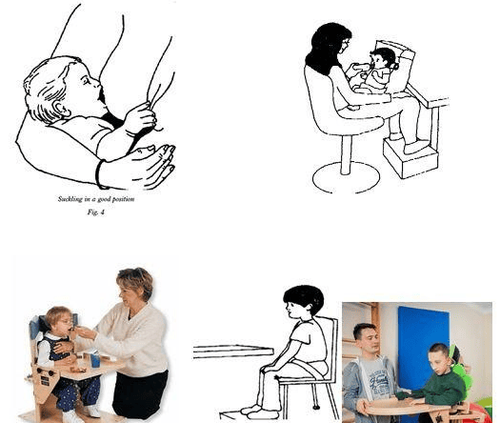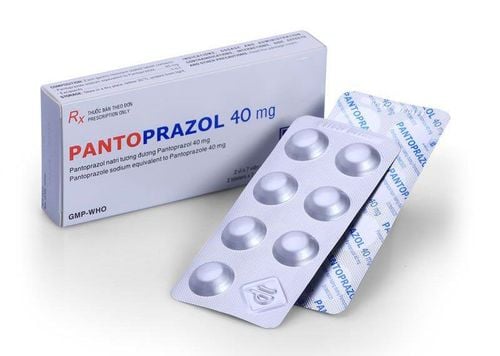This is an automatically translated article.
Posted by Doctor Le Thu Huong - High-tech Unit for Treatment of Cerebral Palsy and Autism - Vinmec Times City International General HospitalSwallowing disorders are difficulties during any stage of the swallowing process. Swallowing disorders can be caused by structural or functional defects of the oral cavity, pharynx, larynx, and esophagus, such as cleft palate, jaw hypoplasia, neuromuscular diseases. ..
1. An outline of swallowing
Swallowing is an important function of human to maintain life, ensure nutrition and development of the body. Along with the development of anatomy of the oral cavity - pharynx, pharynx and brain development, children will gradually get used to and adapt to different types of food, drink, and feeding utensils, especially during the first 2 years of life.
Children's eating skills develop in tandem with gross motor, fine motor, language and social skills.
In a normal person, food follows a route from front to back of the oral cavity, through the pharynx and into the esophagus thanks to the integrity and proper coordination of the nervous and muscular systems. , bones in the mouth, tongue, pharynx, pharynx
Swallowing is divided into 3 main stages: oral phase, pharyngeal phase and esophageal phase
Oral stage: is the stage of processing food into food particles thanks to activity of teeth, tongue and muscles of the mouth, saliva. Food processing time at this stage lasts from 5-30 seconds in normal people. Then the food and drink tablets will be filled down the pharynx to undergo the second stage of swallowing

Pharyngeal stage: is the stage when food pellets from the mouth through the pharynx to the esophagus. At this stage, the most important thing is the operation of the soft palate, pharynx tight muscles, funnel cartilage, epiglottis cartilage... to help the food and drink pellets go in the right direction, not back up the nose or fall into the nose. trachea causing aspiration. Esophageal phase: Food pellets travel down the esophagus by peristaltic waves controlled by autonomic nerves. Gravity helps food move more easily, so eating and drinking should be in an upright position.
2. Swallowing disorders in children with cerebral palsy
2.1. Outline
Swallowing disorders are difficulties in any stage of the swallowing process. Swallowing disorders can be caused by structural or functional defects of the oral cavity, pharynx, larynx, and esophagus, such as cleft palate, jaw hypoplasia, neuromuscular diseases. ..
For children with cerebral palsy, swallowing disorders often occur in both stages of the swallowing process, the oral phase and the pharyngeal stage. Some children have hypertonia, which disrupts the contraction of the esophagus.
2.2. Causes of swallowing disorders in children with cerebral palsy
Due to damage to the central nervous system and cranial nerves, movement disorders such as changes in muscle tone, muscle weakness, movement coordination disorders... can occur in muscle groups. governs the movements of the jaw, cheeks, lips, tongue, palate, and pharynx.
Common oral and oropharyngeal problems in children with cerebral palsy are inadequate lip closure, decreased tongue motor function, tongue position disorder, excessive chewing reflex, tactile disturbances, delayed swallowing , oropharyngeal movements, drooling ... make children have difficulty in controlling saliva, chewing, swallowing and speaking.
In addition, the accompanying cognitive, sensory, behavioral, and anatomical structural defects also affect the swallowing process in children with cerebral palsy.
The feeding position is also an important factor affecting the swallowing process or facilitating the worsening of swallowing disorders

2.3. Some common difficulties in eating in children with cerebral palsy
Disorders in the ability to orientate food: Due to disturbances in vision, hearing, perception
Disorders of control of head, neck, body
Anorexia
Food perception disorder: Due to movement disorders of the mouth and jaw area, causing the child not to get all the food on the spoon, causing the food to drop, scatter, bite the piece too big or too small, can't control the amount of water in the mouth...
Disturbance in the ability to hold food In the oral cavity: Due to the disorder of movement control of the lips, tongue, and oropharynx, food may be spilled during chewing, swallowing, or refluxed into the nose, or form poorly structured food pellets.

Disorders in the ability to chew and transport food in the oral cavity Due to movement disorders of the jaw, tongue, cheeks, making food pellets not good, food has not been processed carefully, food remains in the oral cavity when swallowing..
Swallowing disorders: due to disorders of tongue movement, muscles of the mouth, pharynx, the ability to coordinate swallowing and breathing, closing the larynx...makes children unable to control food and water. drinking through the oropharynx, aspiration, reflux of food up the nose, food backlog in the pharynx. Disorders of the esophagus, stomach: causing food to stagnate, or gastroesophageal reflux. Vinmec International General Hospital is a high-quality medical facility in Vietnam with a team of highly qualified medical professionals, well-trained, domestic and foreign, and experienced.
A system of modern and advanced medical equipment, possessing many of the best machines in the world, helping to detect many difficult and dangerous diseases in a short time, supporting the diagnosis and treatment of doctors the most effective. The hospital space is designed according to 5-star hotel standards, giving patients comfort, friendliness and peace of mind.
Please dial HOTLINE for more information or register for an appointment HERE. Download MyVinmec app to make appointments faster and to manage your bookings easily.














